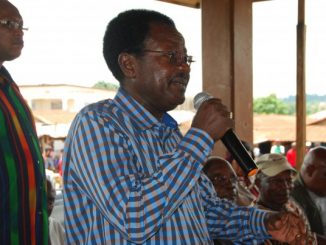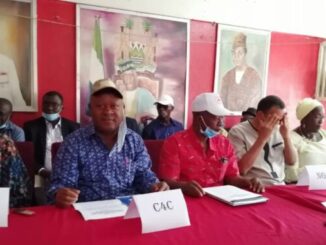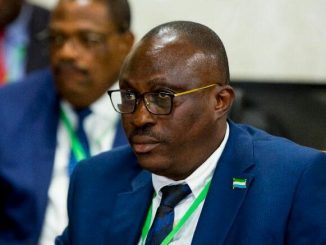Ambassador Kamara Addresses UN Security Council Open Debate On Protection Of Civilians In Armed Conflicts
FEBRUARY 14, 2013
Statement by H.E. Mr. Osman Keh Kamara , Ambassador & Deputy Permanent Representative of Sierra Leone to the United Nations at the The United Nations Security Council Open Debate Under Agenda item ”Protection of Civilians in Armed Conflicts” on Tuesday, 12th February, 2013 :
AMBASSADOR OSMAN KEH KAMARA DURING A PREVIOUS PBC SESSION AT THE UN
Mr. President,
At the outset, allow me to congratulate the Republic of South Korea for assuming the Presidency of the Security Council for the month of February and to wish you full success during your tenure. Accept also our appreciation for convening today’s debate on the protection of civilians in Armed Conflict. We commend the Secretary-General, the High Commissioner for Human Rights, the Assistant Secretary-General for Humanitarian Affairs, and the Director of the International Committee of the Red Cross for their constructive remarks. Undoubtedly, we all share a fundamental responsibility to once again take stock of progress on key protection issues that affect civilians caught up in conflict situations.
Mr. President,
We recognize the significant steps taken by the Security Council to address the challenges confronting the Protection of Civilians, in particular the adoption of resolution 1894 (2009) that laid the foundation to ensure compliance to international provisions aimed at safeguarding civilians caught up in perilous situations. Further, the central challenge identified in the Secretary-General’s report contained in document (S/2012/376), remains a critical concern and underscores the need for a concerted approach to protect the safety, dignity, integrity and sanctity of civilians affected in contemporary armed conflict through adherence to obligations under International Humanitarian Law (IHL), Refugee Law and Human Rights Law. These instruments set out the minimum protection standards applicable, especially where civilians are mostly vulnerable, and seek to prevent situations that might exacerbate vulnerabilities, such as displacement and destruction of civilian property.
Mr. President,
Despite the systematic engagement by the United Nations to find ways to streamline and improve peacekeeping protection standards, there are a number of inherent challenges due to ambiguity on how the United Nations should intervene when Member States lack either the military force or the political will to halt all forms of carnage against innocent civilians. Ultimately, the end-state objective of a peacekeeping mission should include a protection mandate as part of an international response, so as to create the enabling environment to take the appropriate steps to ensure accountability. In that regard, we owe a special gratitude to the peacekeepers who take on the challenge to implement protection functions in the field and it is our responsibility to collectively ease the burden from
2
the peacekeepers by matching resources to tasks in fulfillment of the protection mandate. Peacekeeping missions should be sufficiently resourced with adequate mobility to provide the desired operational latitude in challenging environments.
The development of strategies for a well-structured protection approach shows an unswerving determination to assume a more robust protection posture and the adoption of the Aid-Memoire in 2010 together with a comprehensive protection mandate is a clear testament to the measures aimed at enhancing the implementation of protection of civilians by peacekeeping and other relevant missions.
Mr. President,
Addressing impunity should not be considered an afterthought, but rather, the Security Council should proactively seek to ensure appropriate international response, especially in cases where national authorities fail to take responsibility under the protection laws. On that score, Sierra Leone unreservedly calls on all parties to conflict situations to respect the Laws of Armed Conflict, the International Humanitarian Law and Human Rights Law, as well as the specific domestic criminal law by both state and non-state actors.
Sierra Leone unequivocally condemns the increasing attacks on humanitarian personnel, including health providers’, women and children, and urges Member States to ensure respect for protected persons, incompliance with international humanitarian and human rights law. We commend the support of the United Nations and international partners for the work of the Special Court for Sierra Leone. Through its work, the Special Court for Sierra Leone has made a number of critical contributions to the advancement of the rule of law at the national and international levels. In particular, we hail the Special Court for bringing perpetrators of crimes against humanity and violations of international humanitarian and human rights law committed in Sierra Leone during the course of conflict.
The United Nations is the only organization through which forces of all major powers, including rising regional powers can jointly participate in providing stability. The participation of major powers in missions would not only enhance rapid deployment, but also signal to potential spoilers that opposition to the mission
3
carries real political costs. It would particularly stem the activities of those who supply arms in situations where violations of international law can be regarded as shared responsibility for the use of their weapons to target civilians. Success in reducing the human cost of unregulated arms proliferation will depend largely on creating a sense of responsibility and accountability among those who produce, distribute, and those who use arms against innocent civilians.
Next month, the final United Nations Conference on the Arms Trade Treaty (ATT) will be held here in New York, in order to finalize the elaboration of the ATT, in an open and transparent manner. It is hoped that this platform will comprehensively tie up all loose strings to better serve those whom we have a responsibility to protect. If we continue to delay in this respect, we shall continue to face the risk of their use in committing grave violations of national and international law, which has the potential to destabilize peace and security. We therefore urge member states to consider our moral obligation to humanity as our key guiding principle in, and sincerely commit ourselves to, contributing to the establishment of mechanisms to prevent the diversion of such weapons into the illicit market.
Mr. President,
In conclusion, the timing of this debate cannot be more appropriate, given that Africa is still hosting a number of conflicts. In particular, the spate of extremist activities in Northern Mali is regrettably leading to extensive loss of lives and massive destruction of property, including coveted world heritage sites. Sierra Leone strongly condemns such cowardly acts and will continue to work closely with all partners, particularly within the framework of the wider International Community in seeking a lasting solution to protect civilians.
Let me further express the hope that our collective resolve in this open debate would continue to translate into concrete improvements in the implementation of international human rights and humanitarian law to address the protection challenges.
I thank you, Mr. President.





Leave a Reply